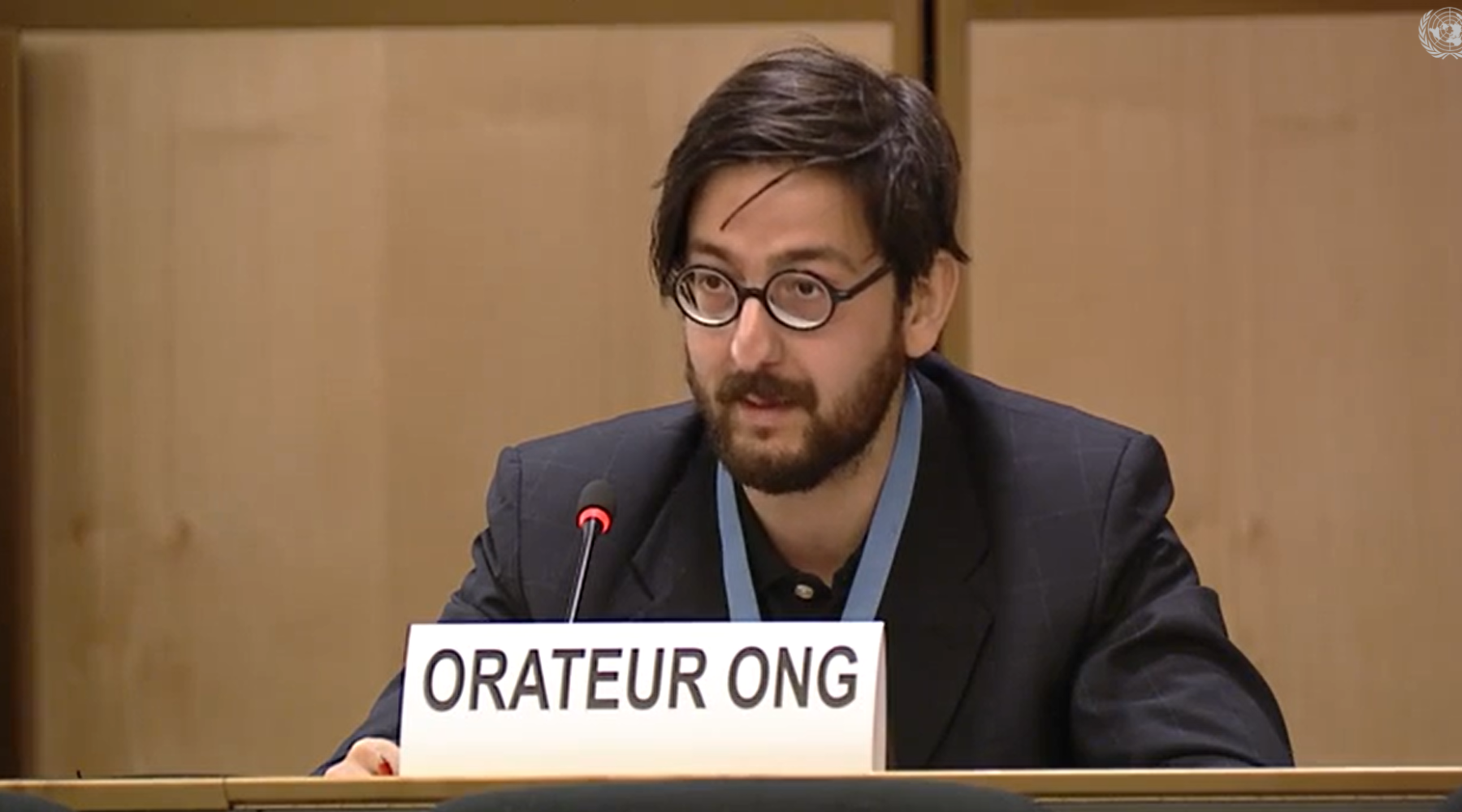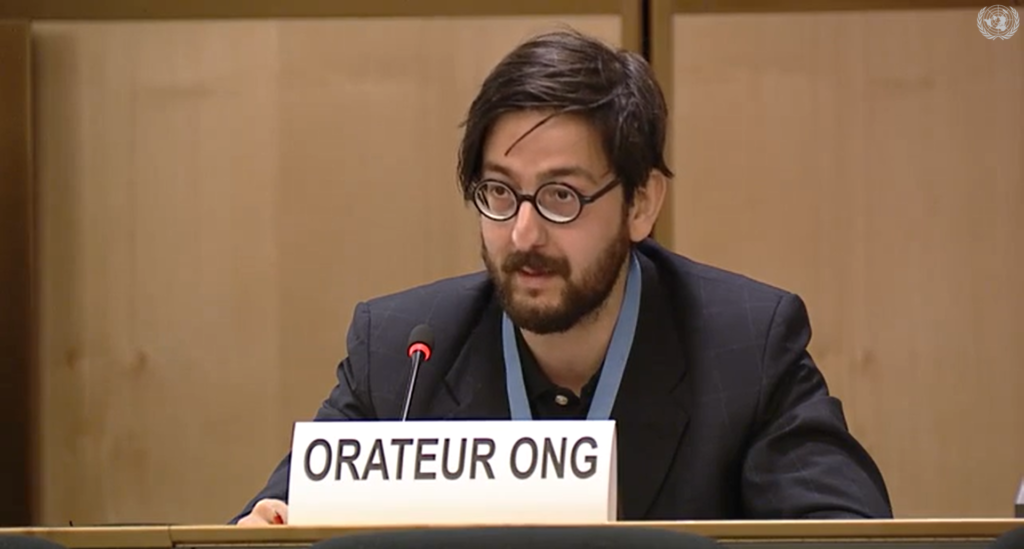


Humanists International’s representative to the United Nations Human Rights Council, Kacem El Ghazzali, has made an oral statement calling for authorities in Somalia to protect Prof. Mahmoud Jama Ahmed who has received death threats.
Last week we reported on Prof. Mahmoud, who was originally sentenced to two and half years in prison for ‘blasphemy’ back in 2019. Following an official pardon from the outgoing president of Somalia, Mahmoud was released in January 2020. On Friday 28th February, and again on Friday 6th March, a very prominent Imam in Somalia, Adam Sunnah, used Friday prayers to call for the death of Mahmoud. At one point in the recording from 28th February (heard by Humanists International), Sunnah can be heard saying of Mahmoud:
“Killing this apostate is bad for him in this life but he will benefit from it in the afterlife.”

Prof. Mahmoud Jama Ahmed is now living in hiding
Humanists International believes Mahmoud to be at serious risk of violence and death. Today the organisation has used an intervention at the United Nations to call on all states and other NGOs to ensure that the Somali authorities protect Mahmoud, and ensure that he is not killed by violent religious preachers or vigilante mobs.
Mahmoud is now living in hiding, away from his family and unable to work, he is being financially supported by Humanists International’s Humanists at Risk fund. We urge anyone who is able to help to make a donation today, or to get in touch if they know any other organisations who can assist us.
Also during the same intervention, Humanists International raised the case of a 17-year-old student and Yemeni national, Tujan Albukhaiti, who was tried on charges of insulting religious feelings because of some tweets. Tujan, who lives in a country where writer Nahed Hatr was assassinated because of similar accusations of “blasphemy,” has also been subjected to several death threats.

Gary McLelland, CEO of Humanists International
Humanists International Chief Executive, Gary McLelland, also commented on the case:
“We are urging all our members supporters around the world to join us in putting pressure on the Somali authorities to protect Mahmoud. There is never any justification for the use of so-called “blasphemy” laws, but this case is even more egregious when we consider the mild statement at the heart of this accusation, from a prominent Somali academic.
“Today we asked the United Nations, and all individuals and institutions who value free expression, to join us highlighting Mahmoud’s case around the world. We will not allow him to be murdered with impunity by religious bullies.”
Read the full text of the oral statement below

Kacem El Ghazzali, speaking for Humanists International at the UN Human Rights Council
ORAL STATEMENT
International Humanist and Ethical Union
UN Human Rights Council, 43rd Session (24th February – 20th March 2020)
General Debate Item 4Kacem El Ghazzali
“Killing this apostate is bad for him in this life but he will benefit from it in the afterlife”
This absurd yet clear incitement to murder was pronounced on 28 February by a prominent Imam in Somalia against Mahmoud Jama Ahmed, a Humanities professor at the university of Hargeisa.
2019 Mahmoud was sentenced to two and half years in jail for blasphemy, the prosecutors petitioned to increase Mahmoud’s sentence to death, but the original sentence was upheld.
After 10 months in Jail, Mahmoud was released by presidential pardon, on the condition that he does not publish any articles and he is suspended from any university work for five years.
So, what did Professor Mahmoud do that was considered blasphemous and worthy of the death penalty? He asked via Facebook whether “praying to God for water is really a useful strategy to overcome the drought that affects Somalia every year?”
In a similar case, 17-year-old student and Yemeni national, Tujan Albukhaiti, was tried on charges of insulting religious feelings because of some tweets. Tujan, who lives in a country where writer Nahed Hatr was assassinated because of similar accusations of “blasphemy,” has also been subjected to several death threats.
The cases of Mahmoud and Tujan demonstrate clearly how blasphemy laws are being used as pretext to silence public intellectuals and students from expressing their opinions or any constructive criticism.
We object fundamentally to the notion that “blasphemy” should be treated as a criminal offence, and we call on Somalia to offer protection to Professor Mahmoud and on Jordan to guarantee the safety of the 17 year-old student and to drop the blasphemy charges against her.
مجلس حقوق الإنسان التابع للأمم المتحدة ، الدورة 43 (24 فبراير – 20 مارس 2020)
المناقشة العامة البند 4
قاسم الغزالي
“قتل هذا المرتد أمر سيء له في هذه الدنيا، لكنه سيستفيد منه في الحياة الأخرة”
هذا التحريض السريالي على القتل أعلنه إمام مشهور في الصومال ضد أستاذ الفلسفة محمود جامع أحمد.
الأستاذ محمود حكم عليه بالسجن لمدة عامين ونصف بتهمة ازدراء الإسلام، أما المدعي العام فقط اتهمه بالردة و طالب بإعدامه.
بعد 10 أشهر من الإعتقال، تم إطلاق سراح محمود بموجب عفو رئاسي، شريطة أن لا ينشر أي مقالات أو أن يزاول أي عمل جامعي لمدة خمس سنوات.
لكن نتسائل، ما الذي فعله هذا الأستاذ حتى يتم اتهامه بالردة ويطالب المدعي العام بإعدامه؟
ببساطة طرح الأستاذ السؤال البديهي والمشروع الآتي: “هل صلاة الإستسقاء استراتيجية ناجعة للتغلب على الجفاف؟”
و في قضية أخرى تتم هذه الأيام بالأردن محاكمة تلميذة تدعى تواجان البخيتي بتهمة إهانة المشاعر الدينية. توجان أصبحت تعيش حالة من الرعب مهددة من جهة بالاعتقال ومن جهة أخرى الاغتيال.
السيد الرئيس، إن قضيتا كل من الأستاذ محمود والتلميذة توجان توضحان بجلاء كيف أن قوانين التجديف تستخدم كذريعة من أجل إسكات المثقفين والطلاب.
لذلك نحن نعترض من جديد على اعتبار “التجديف” جرائم جنائية، وندعو الصومال إلى توفير الحماية للأستاذ كما نطالب دولة الأردن بضمان سلامة الطالبة ذات الربيع ال 17 وإسقاط تهم التجديف عنها.